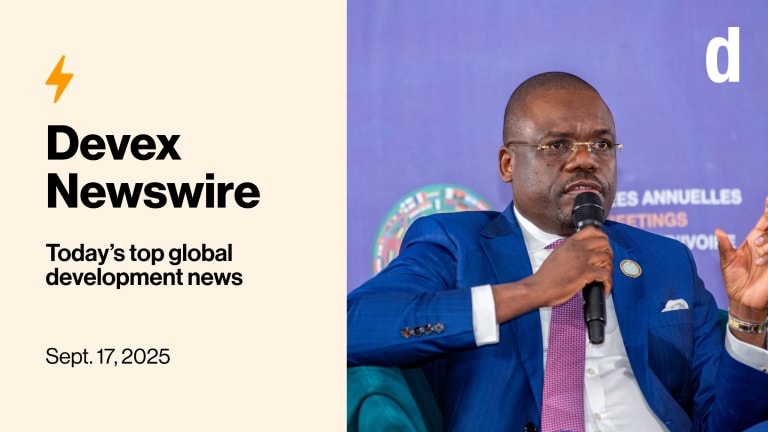
This is a preview of Newswire
Sign up to this newsletter for an inside look at the biggest stories in global development, in your inbox daily.
The situation in Ethiopia has taken a dramatic turn, with Tigrayan fighters declaring control of the city of Mekelle and Ethiopian government troops forced to retreat.
+ Need a new job? Join us this morning at 10 a.m. ET (4 p.m. CET) for a session on how to land a consulting gig or staff position with a top development institution.
As Ethiopian troops left the city, they reportedly entered the offices of UNICEF and the World Food Programme to disconnect their internet.
“This act violates UN privileges and immunities and the rules of International Humanitarian Law regarding respect for humanitarian relief objects. I condemn this action in the strongest terms,” said UNICEF Executive Director Henrietta Fore in a statement. Meanwhile, as rebel supporters celebrated their control of the city, the Ethiopian government declared a unilateral cease-fire, to begin immediately.
ICYMI: While direct budget support to Ethiopia from the EU is paused over the current conflict, the bloc is already looking ahead on how aid to the country might look in 2027.
Better tomorrow
At the G-7 summit in the United Kingdom earlier this month, world leaders launched the Build Back Better World partnership — aka B3W — a global infrastructure initiative widely seen as a response to China’s Belt and Road Initiative. Speaking at the Center for Global Development on Monday, Daleep Singh, U.S. President Joe Biden’s deputy national security adviser for international economics, offered a glimpse of how U.S. development agencies might be pulled into the effort.
“Our aim has not been to create an anti-China coalition,” he said, though he emphasized that the BRI shouldn’t be “the only game in town.”
Devex Pro: What the G-7's global infrastructure plan means for development agencies
Un-flatten the curve

International Monetary Fund chief Kristalina Georgieva and African Department Director Abebe Aemro Selassie warned Monday that if vaccination doesn’t accelerate in sub-Saharan Africa the result will be, “repeated waves of infection, which will exact an ever-increasing toll on the lives and livelihoods of the region’s most vulnerable, while also paralyzing investment, productivity, and growth.”
The big interview
Vince Chadwick has a wide-ranging interview with Odile Renaud-Basso, head of the European Bank for Reconstruction and Development.
On whether the effort to reexamine European development finance has been a success:
“Indeed the outcome is not a revolution — probably we could have guessed that since the beginning. The process has also been made longer and a bit less focused because of the COVID-19 crisis.”
On the bank’s potential leverage over Belarus following the latter’s hijacking of a civilian airliner last month:
“The more radical, far reaching option would be to stop everything, like we have been doing in Russia — no new projects, no even technical cooperation.”
On how EBRD’s expansion relates to its original mandate:
“The logic of the EBRD since it was created, and its expansion, is all related to stabilization of the European neighborhood. I don't see any role for the EBRD in Asia or in Latin America. In my perspective, it's not in our DNA and in our mandate.”
+ To get the full interview and analysis, sign up to receive today's edition of Devex Invested, the weekly brief on how business and development finance leaders are tackling global challenges.
It’s a WASH
“You need to create a culture that means cleaning after the pandemic is not going to go back to a lower-level activity.”
— Wendy Graham, professor of obstetric epidemiology, London School of Hygiene & Tropical MedicineThe COVID-19 pandemic brought new attention to the dangers facing front-line health care workers. But left behind have been hospital cleaners — who had a higher risk of contracting the coronavirus than intensive care workers, according to one study — and who are often untrained and relatively unheard within hospital systems.
Read: Ensuring hospital cleaners are a 'neglected workforce' no more
The COVID-19 pandemic has also brought new attention to mental health, but it’s a topic that still suffers from stigma and misunderstanding. Mental health experts from global development organizations tell Emma Smith how they are overcoming that challenge, among other things by avoiding loaded language and terminology.
Up the ante
The U.S. House of Representatives appropriations bill for State, Foreign Operations and related programs for fiscal year 2022 proposes even more funding than Biden’s budget request. The bill includes:
• $62.24 billion in overall funding (compared with $58.5 billion requested by Biden).
• $10.6 billion for global health and preventing future pandemics.
• $3 billion to address the climate crisis.
ICYMI: Biden administration releases full budget request for fiscal year 2022
In the news
The U.N. Security Council is holding its first formal meeting on cybersecurity today, to address increasing attacks by hackers on countries’ critical infrastructures. [France 24]
A charity watchdog has released a report revealing “excessive and inappropriate” spending by the former chief executive of ChildFund Ireland. [Belfast Telegraph]
U.N. peacekeeping missions are at risk of shutdown if U.N. General Assembly members fail to agree on a $6 billion budget for this year through 2022. [Reuters]
Sign up to Newswire for an inside look at the biggest stories in global development.








